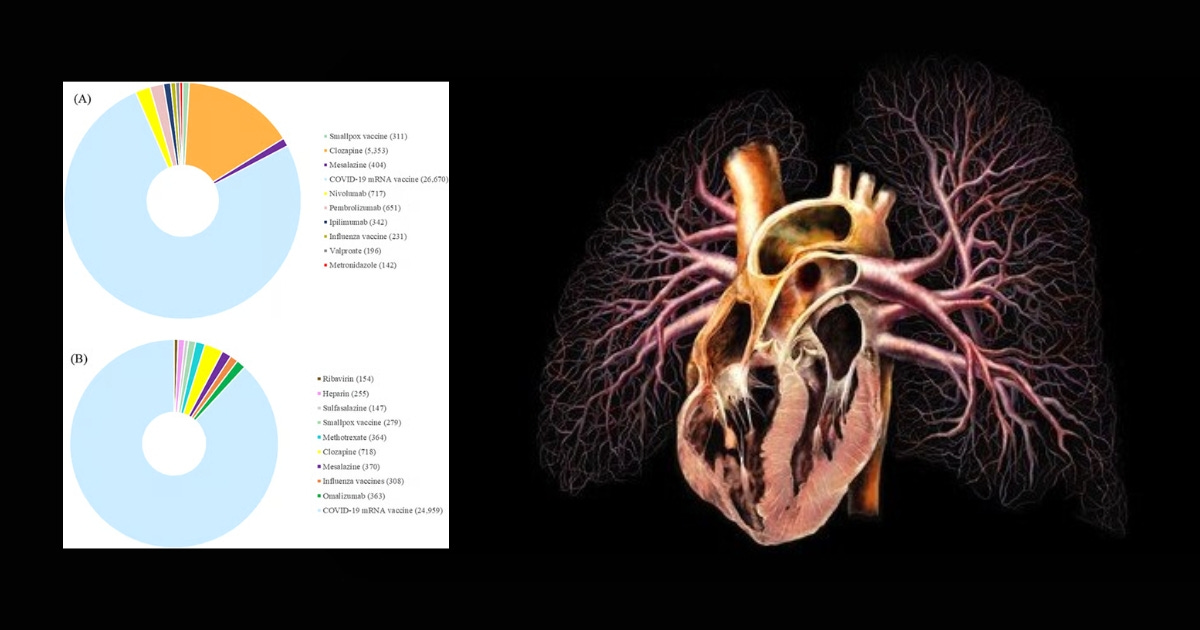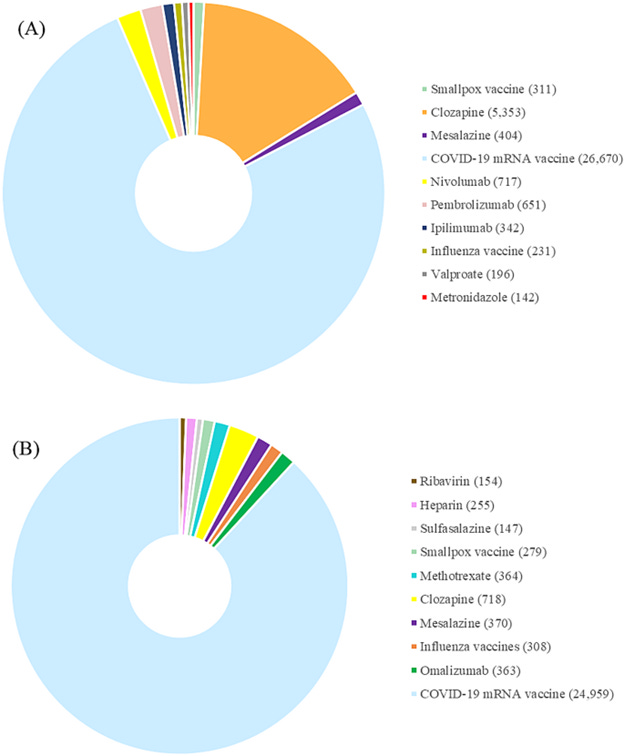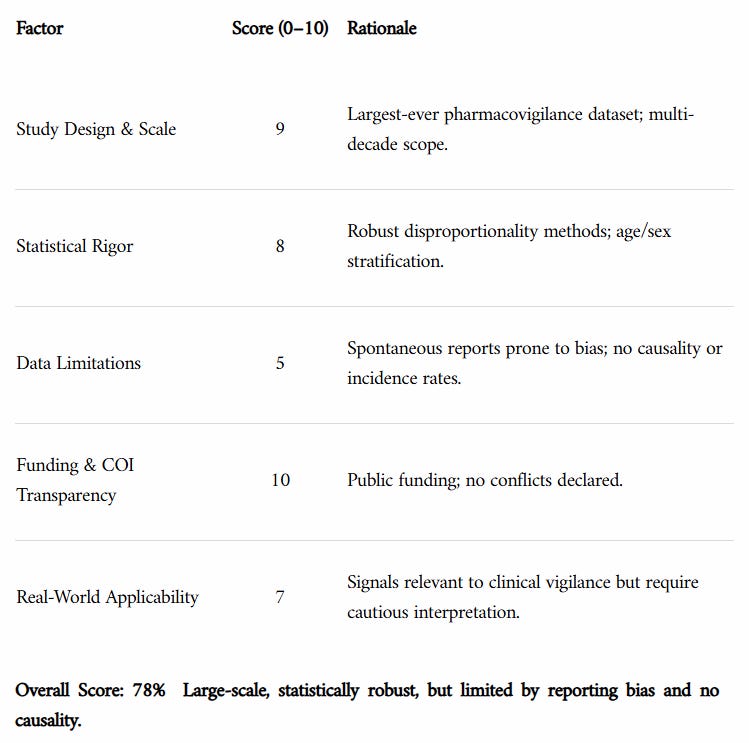Global Data Bombshell: COVID-19 mRNA Vaccines Top List of Drugs Most Linked to Heart Inflammation
And the media won’t say a word about it.
This article originally appeared on TrialSite News and was republished with permission.
Guest post by Dong Keon Yon, MD (Pediatrics), PhD, FACAAI, FAAAAI, ATSF
A sweeping new investigation led by Dr. Jaehyeong Cho, Dong Keon Yon and colleagues at Kyung Hee University as well as other major Korean centers and published in Scientific Reports (Aug. 7, 2025), has mapped the global pharmacovigilance landscape of two potentially life-threatening heart inflammations — myocarditis and pericarditis — across more than five decades of safety reports. The hypothesis: that certain widely used drugs, including vaccines, are disproportionately reported alongside these conditions. The results are striking, even unsettling to say the least: COVID-19 mRNA vaccines accounted for the vast majority of reported cases in both categories, raising complex, and frankly, troubling questions for clinicians, regulators, and the public.
Study Design & Method
The team mined the world’s largest repository of adverse drug reaction reports — over 35 million records from 140+ countries — covering 1968–2024. They excluded drugs already used to treat heart inflammation to avoid confounding, then ranked the top 10 most frequently reported drugs for each condition. Statistical “signal detection” was performed using reporting odds ratios (ROR) and Bayesian information components (IC), tools that flag disproportionately high associations.
Dong Keon Yon, Co-Corresponding Author
Source: Kyung Hee University
Findings
The numbers are staggering:
Myocarditis: 35,017 total reports; 76.16% (26,670 cases) linked to COVID-19 mRNA vaccines, followed by clozapine (15.29%).
Pericarditis: 24,959 reports; 88.15% (22,001 cases) linked to COVID-19 mRNA vaccines, with no other drug exceeding 10%.
Other consistent signals included smallpox and influenza vaccines, clozapine, and mesalazine. Immune checkpoint inhibitors (nivolumab, pembrolizumab, ipilimumab) showed disproportionately high fatality rates in myocarditis cases (~20%). Alarmingly, the highest statistical signals were in youth aged 0–17 for both conditions.
A surge in case reports appeared in 2021 — coinciding with mass COVID-19 vaccination campaigns and the pandemic’s acute phase. While the study cannot prove causality, the sheer proportion of vaccine-associated reports demands further scrutiny.
Proportion distribution of reports of myocarditis (A) and pericarditis (B) adverse events with different drugs.
Source: Scientific Reports
TrialSite Perspective
One of the most unsettling revelations in the study is the disproportionately high statistical signal for myocarditis and pericarditis in the 0–17 age group — a population in which COVID-19 has been overwhelmingly mild to moderate for roughly 95%+ of cases, and even more so in the post-Omicron era.
True severe outcomes such as MIS-C were rare and largely concentrated during the Delta variant surge. When weighed against the generally lower infection risk profile of youth — bolstered by widespread pre-existing exposure and residual natural immunity — the emergence of elevated heart inflammation signals in this cohort may profoundly reshape the risk-benefit equation even more than we already know.
In this context, U.S. Health and Human Services Secretary Robert F. Kennedy Jr.’s recent decision to remove the formal recommendation for COVID-19 vaccination in young children gains new relevance. The data underscore the ethical imperative for targeted, age-stratified public health policy — especially when a medical intervention shows heightened adverse event reporting in a group with minimal baseline risk from the disease itself.
#ad: Your diet isn’t perfect—and that’s okay.
Global Healing’s Organic Multivitamin is here to help you fill the gaps with over 30 essential vitamins and minerals your body needs to feel its best.
There are no coatings, no fillers—just clean, high-quality nutrients your body can actually use. It’s a simple, effective way to support your daily health and give your body the care it deserves.
Experience the difference you can actually feel. Use code VFOX at checkout for 10% off your order.
DISCLOSURE: This is an affiliate link. I may earn a commission if you make a purchase here, at no additional cost to you.
Limitations
The dataset depends on spontaneous reporting, vulnerable to underreporting, overreporting, and diagnostic uncertainty. Media attention heightened clinical vigilance, and massive vaccine rollout campaigns may have amplified report volumes — a phenomenon known as stimulated reporting. No incidence rates can be derived, and causality cannot be confirmed by these associations alone.
Funding & Disclosure
Funded by multiple South Korean government research grants. Authors declare no competing interests.
Conclusion & Implications
This global analysis signals a clear need for targeted cardiac safety monitoring, especially in younger populations and males, where myocarditis risk appears elevated. Clinicians should be alert to symptoms of chest pain, shortness of breath, or palpitations in the days after certain vaccinations or high-risk drug exposures. Policymakers face a delicate balancing act: these findings do not erase the substantial benefits of vaccines but underscore the ethical imperative for transparency, patient education, and tailored risk mitigation strategies.
In the words of one cardiologist reviewing the data, “This is not an anti-vaccine study — it’s a call to refine how, when, and to whom certain medicines are given.”
TrialSite Evidence Strength Indicator™
Citation: Cho, J., Jo, H., Park, J., et al. “Top 10 drugs most frequently associated with adverse events of myocarditis and pericarditis.” Scientific Reports. Published August 7, 2025. doi:10.1038/s41598-025-13234-6
Copyright 2025 TrialSite News






